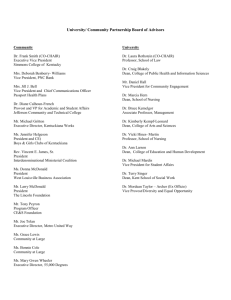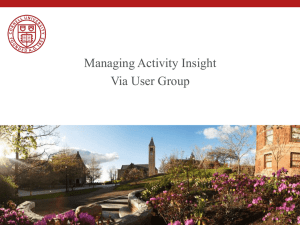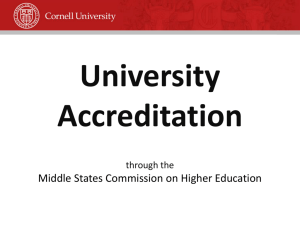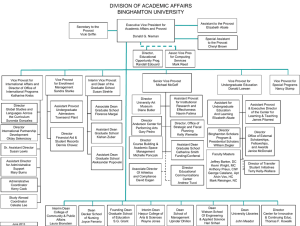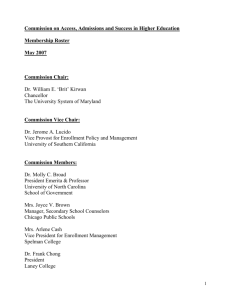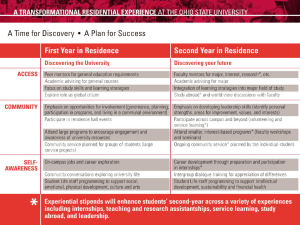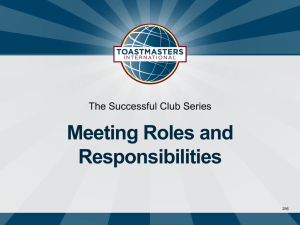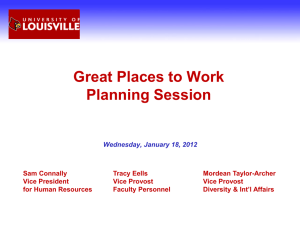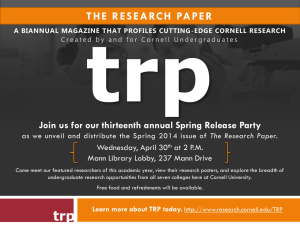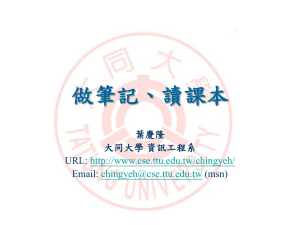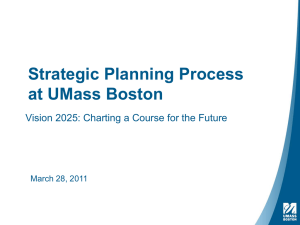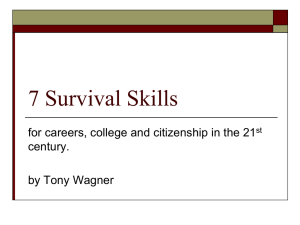New Destinations Overview and WCMC Initiatives 051412
advertisement
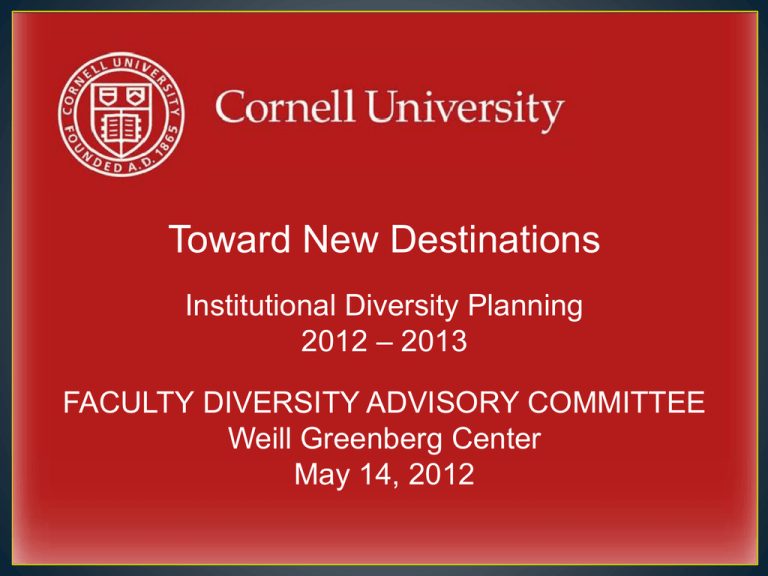
Toward New Destinations Institutional Diversity Planning 2012 – 2013 FACULTY DIVERSITY ADVISORY COMMITTEE Weill Greenberg Center May 14, 2012 As a large, decentralized, researchintensive institution that operates on multiple campuses on a global scale, Cornell finds that embedded responsibility under collective leadership guided by professional expertise serves as an effective model for significant and multi- faceted progress across the institution. It is this responsibility structure that is charged with bringing to reality our values and statement on diversity in “Open Doors, Open Hearts, Open Minds.” “Open Doors, Open Hearts, And Open Minds” Developed by committee of faculty, staff and students in 1999. Adopted by the Employee Assembly and the University Assembly, December 1, 1999; the Student Assembly, December 3, 1999; the Faculty Senate, December 8, 1999, and the Graduate and Professional Student Assembly, January 24, 2000, and endorsed by the Board of Trustees. • Faculty: Increase the size/quality in strategically important academic areas; significantly increase diversity through new hires and enhanced retention efforts. • Undergraduate Students: Increase the proportion of underrepresented minorities and students from other cultures • Graduate/Professional Students: Implement support mechanisms to promote academic success/retention of minority graduate/professional students • Staff: Attract and retain diverse staff workforce “As a world-class research university, Cornell recognizes that learning, discovery, creativity, and the innovative dissemination and application of knowledge benefit tremendously from the full participation of individuals with diverse points of view, coming from varied life experiences. To be on the cutting edge in all aspects of our mission, we must boldly pursue an inclusive academic and work environment.” President David Skorton February 15, 2012 University Diversity Council’s Institutional Diversity Planning (To Be Implemented 2012-2013) Specifically-focused Menu of Annual Initiatives which: • Defines a set of local advances; • Targets particular constituencies; and • Presents a comprehensive list of University Diversity Goals representing the university’s commitment to diversity and inclusion. Each school, college, and major unit will select the five Annual Initiatives that best match their particular contexts, goals, and strategic plans. For each unit, these will become the areas of focused effort in support of diversity. Each unit will report annually on their progress in these areas. Toward New Destination’s University Diversity Goals provides a broad institutional framework for the five Annual Initiatives, placing each in relation to a wider aspirational framework. The framework is structured according to four Core Diversity Principles: COMPOSITION ENGAGEMENT INCLUSION ACHIEVEMENT • Composition: demographic make-up of the unit or college; • Engagement : personal, social, and professional commitment to institutional goals and activities; • Inclusion: climate and interpersonal relations; and • Achievement: levels of attainment for underrepresented individuals or groups. Toward New Destinations Constituent Groups Undergraduate students Tenured/tenure track faculty Graduate and professional students Post-docs and academic professionals* Administration and staff Off-campus constituents - vendors/ businesses, local community organizations, and institutions Cornell’s extended community - parents, alumni, donors, and friends of Cornell * Those with terminal degrees who have responsibilities in research, teaching, or the libraries, but are not included in the tenure-track ranks Increase diversity in a target area Measurably increase diversity for a target dimension of the school/college/unit. Increase targeted pipelines Develop or enhance relationships with strategic partners, institutions, organizations, and communities. Evaluate and reduce attrition Develop and implement processes to evaluate attrition and create retention strategies. Students and young alumni at 2011 Office of Alumni Affairs CALC event attended by 810 attendees. • Increase engagement for a target group Enhance opportunities for career or professional development, and for campus and community involvement. • Strengthen academic, co-curricular, and professional development initiatives promoting engagement across difference Increase and enhance co-curricular and academic offerings and events that promote engagement across difference As a community service, Cornell’s Veteran Colleague Network Group supports military personnel stationed overseas ENGAGEMENT • Support and expand academic research, collaboration, and intellectual initiatives around diversity Highlight and encourage intellectual work and conference presentations on topics relevant to the study of diversity. • Develop administrative mechanisms to record, recognize, and motivate engagement in diversity efforts Build processes for recognizing active engagement in diversity efforts through annual activity reports, university or college/unit sponsored diversity awards, personnel dialogues and promotion reviews, outreach reports, or other motivational initiatives. • Improve multicultural competency Create or enhance initiatives designed to build intercultural skills and knowledge. • Increase the effectiveness of communication around diversity Increase the visibility and influence of the college’s or administrative unit’s messaging about excellence, learning, collaboration, and achievement through diversity. • Provide grants in support of diversity programs Fund or seek funding for competitive grant opportunities to pursue programs and initiatives relevant to diversity. Faculty Diversity Institute hosted by Center for Teaching Excellence, January 2012 • Improve internal administrative structures that support diversity Provide opportunities or create processes to review and revise internal departmental structures and practices to support diversity. • Increase the availability and closer integration of work/life support systems Provide for a review and revision of the approach to support a more flexible work and educational environment, and to the structuring of operations to support individuals from diverse backgrounds. Professor Maria Fitzpatrick, in Human Ecology, presents on February 2, 2012 on The Economics of Early Child Care and Education: Latest Research and Yet Unanswered Questions, as part of a faculty work/life series. • Support and increase academic or professional achievement for a target group, area, or constituency Improve the achievement of a target group in relationship to academic honors and awards, research, fellowships, publications, participation in specialty programs, or career/professional outcomes. • Provide for recognition for innovative research in support of diversity Highlight and recognize outstanding or innovative intellectual contributions in the area of diversity. LSAMP Scholars Program: Undergraduate students, interested in gaining a deeper understanding in an engineering-related field, have the opportunity to conduct and present research over a ten-week duration under the auspices of a Cornell Engineering faculty research mentor. • Highlight and advance an understanding of the relevance of diversity to excellence in research and to the production of knowledge Promote inquiry on the significance of diversity in knowledge creation and support awareness of the catalyzing effects of difference. • Support career development for a target area or constituency Increase the diversity of participants in leadership training, conference participation, rewards and recognitions, strategic planning, and job rotational assignments. Students in the Multicultural Mentoring Program offered by the Office of Academic Diversity Initiatives. University Diversity Council The Cornell University Diversity Council is charged with supporting the president and provosts in providing the overall vision and framework for the university’s achievement of strategic goals focused on faculty, staff, and student diversity, reflecting the aspirations of the university as expressed in its 2010-2015 strategic plan. The president and provosts, with support from the University Diversity Council, will hold leaders and units across the university accountable for developing and implementing plans to achieve these goals, for designing and using appropriate methods of assessment, and for demonstrating significant annual progress on the goals. • • • • • Renee Alexander, Associate Dean and Director of Intercultural Programs, Student and Academic Services (undergraduates) Lynette Chappell-Williams, Associate Vice President for Inclusion and Workforce Diversity, Human Resources and Safety Services (staff) Yael Levitte, Associate Vice Provost for Faculty Diversity and Development, Academic Affairs (faculty) A.T. Miller, Associate Vice Provost for Academic Diversity Initiatives, Undergraduate Education (undergraduates) Sheri Notaro, Associate Dean for Inclusion and Professional Development, the Graduate School (graduate/professional students) Left to right: Yael Levitte, A.T. Miller, Sheri Notaro, Renee Alexander, Lynette Chappell-Williams 16 • Debra Lenard, Professor and Vice Chair for Laboratory Medicine, Director of Clinical Laboratories, Director of Pathology Residency Training Program • Carla Boutin-Foster, Associate Professor of Medicine, Associate Professor of Public Health • Rache Simmons, Professor of Surgery, Anne K. and Edwin C. Weiskopf Professor of Surgical Oncology 17 • • • • • • • • • • Susan Murphy, Vice President for Student and Academic Services Mary Opperman, Vice President for Human Resources and Safety Services John Siliciano, Senior Vice Provost for Academic Affairs Laura Brown, Vice Provost for Undergraduate Education Barbara A Knuth, Vice Provost and Dean of the Graduate School Marin Clarkberg, Director, Institutional Research and Planning Kent Hubbell, Dean of Students David J. Skorton, President Kent Fuchs, Provost Laurie Glimcher, Provost for Medical Affairs and Dean of Weill Cornell Medical College 18 University Diversity Council Outreach and Consultation Chart Senior Leadership Meeting Academic Dean’s Meeting Provost’s Staff Meeting Admissions HR Council Senior Staff Meeting President HR Community Meeting Associate Dean’s Group SAS Senior Staff Provosts Faculty Senate Diversity Data Group Administrative Leadership Trustee Diversity Working Group Faculty Directors of Ethnic Studies programs Institutional Research Communications Managers Diversity Community Diversity Officers Extended Diversity Professionals Group President’s Council of Cornell Women Harassment Advisors, Title IX Coordinators, Bias Prog Liaisons Diversity Consortium Annual Meeting of Campus Life Employees Tompkins County Workforce Diversity Cte Committee Local Leaders of Color UAW Diversity Advocate Cte College Associates City of Ithaca Workforce Diversity Advisory Cte Assemblies Students to Unite Cornell • Enhance transparent diversity metrics and create diversity dashboard • Unveil revised University Diversity Web Page • Identify five diversity initiatives for each college and administrative unit • Host fall 2012 retreat with deans and vice presidents for implementation of initiatives • Report on initiatives at Board of Trustees meeting in October COMPOSITION 1. Establish search committee processes that adhere to AAMC recommended practices to reduce bias and enhance diversity (multi-year project) Year 1 Metric: Define expected search committee processes & initiate use. (In future, measure impact on faculty diversity) 2. Enhance work-life systems through on site childcare facility and standard parental leave policy for faculty Metric: Establish facility plan and implement policy INCLUSION 3. Publicize availability of resources to report and address workplace behavior concerns, including CME course for faculty Metric: Resources included in Faculty Diversity and Faculty Development web sites, and >95% of faculty take course. 4. Establish an LGBT Committee across all constituency groups to enhance the climate for LGBT individuals at WCMC Metric: Enumerate programs and policies developed and implemented by the committee ACHIEVEMENT 5. Continue annual “Achieving Successful and Productive Research Careers” (SPARC) Conference in collaboration with Rockefeller and MSK targeting academic support and resources for underrepresented groups at all levels Metric: Track grants, publications and other scholarly activities of attendees
